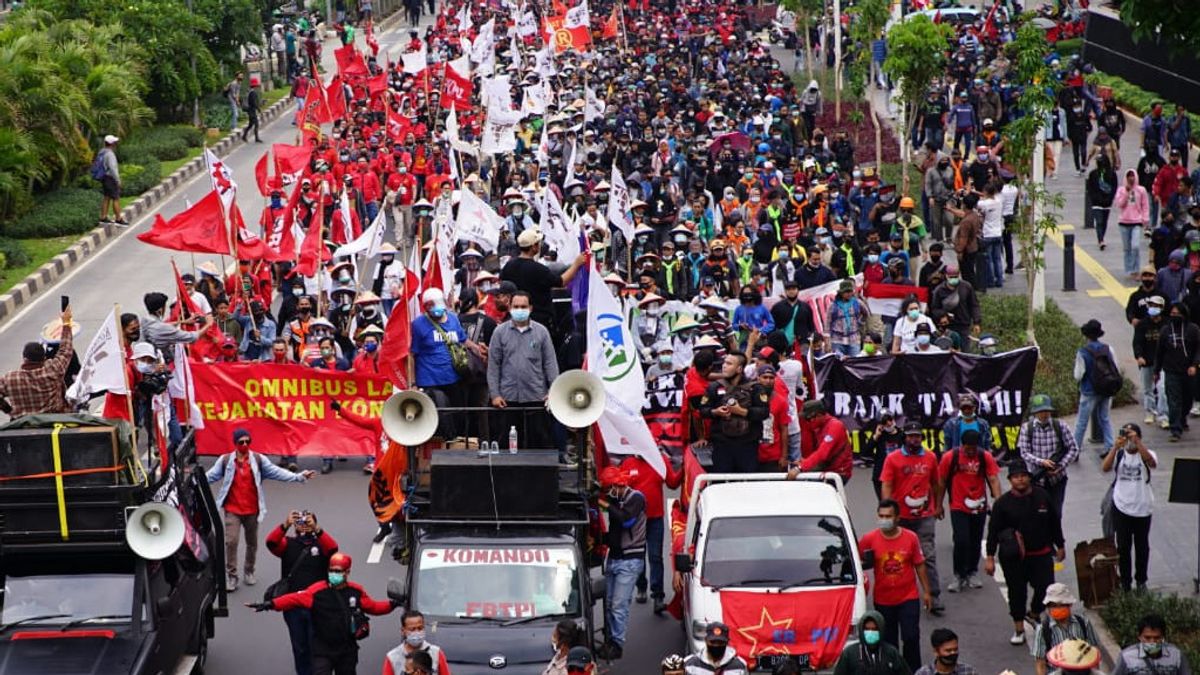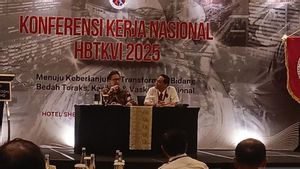JAKARTA - Special staff of the Ministry of Manpower (Menaker) Dita Indah Sari said that the Job Creation Law still accommodates the interests of workers and adopts various good things in Law Number 13 of 2003 concerning Manpower.
"Of course we adopt the good things in the Manpower Law, and we also need to accommodate the times so that the labor regulations remain relevant," said Dita in Jakarta, as reported by Antara, Wednesday, October 14.
He explained that the regulation seeks to ensure that workers still receive their rights when carrying out their obligations, such as severance pay, contract status, leave, outsourcing, and wages.
In addition, he added, the Omnibus Law is also able to answer various issues related to the workforce cluster in accordance with the latest developments, considering that the previous Law was almost 17 years old.
One of them is related to severance pay for employees who are laid off, which is currently one of the highest in the world, despite the downward revision, from 32 times the previous salary to 25 times the salary.
"In Indonesia, the severance pay rate is one of the highest in the world and this is not balanced with our productivity level. The realization of 32 times this salary is that no one wants to bear it and not many are able to run it," said Dita.
He added that the Job Creation Law also provides innovations that are more relevant for workers who have been laid off, namely providing job loss insurance (JKP) with numbers that do not burden employers.
"The JKP benefits only exist in the Job Creation Law, the figure no longer burdens workers or employers with additional contributions. The government will recompose existing contributions from BPJS Ketenagakerjaan," said Dita.
Regarding the issue of contracts, Dita explained that the terms regarding contract workers still adopt the rules in the Manpower Law, especially in articles 56 and 59, which are also adjusted to the latest developments.
"Why is the maximum contract limit no longer listed? Because this will be included in a Government Regulation, later so that there is flexibility. The characteristics of the work relationship in each sector can be different," he said.
Dita also clarified misinformation regarding leave, especially for female workers, because the Job Creation Law still regulates the provision of maternity leave and menstrual leave.
"There is no elimination of maternity and menstrual leave. Our (Manpower) Minister is a woman, half of our workers are women. All are still there and their wages are paid," said Dita.
For the terms of layoffs, Dita ensured that there were four stages that had to be passed if the decision was actually made, so that employers and workers could find the best solution.
"Employers must keep providing information, they cannot be unilateral. If workers do not agree, there must be negotiations that can be accompanied by the union. If they do not agree, the government must mediate. If it is not finished, then it will enter legal channels," he said.
Dita also said that each region can still set the Regency / City Minimum Wage (UMK) according to the calculation of inflation and economic growth, although it is not required.
"If the UMP is considered to be representative, it is not necessary. Each region has different characteristics, if the majority of workers are in UMKM, it must be adjusted. That's why the choice is said to be, not mandatory," said Dita.
Overall, Dita said the government would accommodate several things that were not yet detailed in the Job Creation Law through the issuance of a Government Regulation (PP) involving trade unions.
"There are at least three to four PPs that we will discuss. Regarding labor arrangements, which include contracts, outsourcing, and others, PP regarding job loss security, and PP on wages," he said.
The English, Chinese, Japanese, Arabic, and French versions are automatically generated by the AI. So there may still be inaccuracies in translating, please always see Indonesian as our main language. (system supported by DigitalSiber.id)











